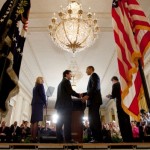Contract Rights Under Assault
 In 1789, as the inchoate American government was climbing out of the mountainous debt left over from the Revolutionary War, a thorny political problem emerged. While most of the chattering class was consumed with the debate over whether the states’ war debt should be federalized, another far more visceral controversy arose. Because the Continental Congress lacked funds during the war, the Revolution was funded partly by wealthy private citizens who invested in bonds. As a result of the lack of governmental money, many American soldiers were given worthless IOUs at the end of the war, as states scampered for a way to give the patriots their back pay. Many of these soldiers panicked, and sold their IOUs to speculators for as little as fifteen cents on the dollar. The problem was, once the federal government began repaying the debt, the value of the bonds soared. So who should get the money: the patriots who fought bravely for their country and only sold the IOUs because of fear they would get nothing from their government, or the speculators?
In 1789, as the inchoate American government was climbing out of the mountainous debt left over from the Revolutionary War, a thorny political problem emerged. While most of the chattering class was consumed with the debate over whether the states’ war debt should be federalized, another far more visceral controversy arose. Because the Continental Congress lacked funds during the war, the Revolution was funded partly by wealthy private citizens who invested in bonds. As a result of the lack of governmental money, many American soldiers were given worthless IOUs at the end of the war, as states scampered for a way to give the patriots their back pay. Many of these soldiers panicked, and sold their IOUs to speculators for as little as fifteen cents on the dollar. The problem was, once the federal government began repaying the debt, the value of the bonds soared. So who should get the money: the patriots who fought bravely for their country and only sold the IOUs because of fear they would get nothing from their government, or the speculators?

 President Barack Obama’s 35-minute speech on education at Wright Middle School in Madison on Wednesday was interrupted by applause at many points, but most of the reaction was pretty low-key. Three lines drew what seemed to be more enthusiastic responses from the crowd of more than 500, most of them teachers, parents, and students at the 250-student school. Each of those lines says something significant about public sentiment and Obama administration priorities on education issues.
President Barack Obama’s 35-minute speech on education at Wright Middle School in Madison on Wednesday was interrupted by applause at many points, but most of the reaction was pretty low-key. Three lines drew what seemed to be more enthusiastic responses from the crowd of more than 500, most of them teachers, parents, and students at the 250-student school. Each of those lines says something significant about public sentiment and Obama administration priorities on education issues.